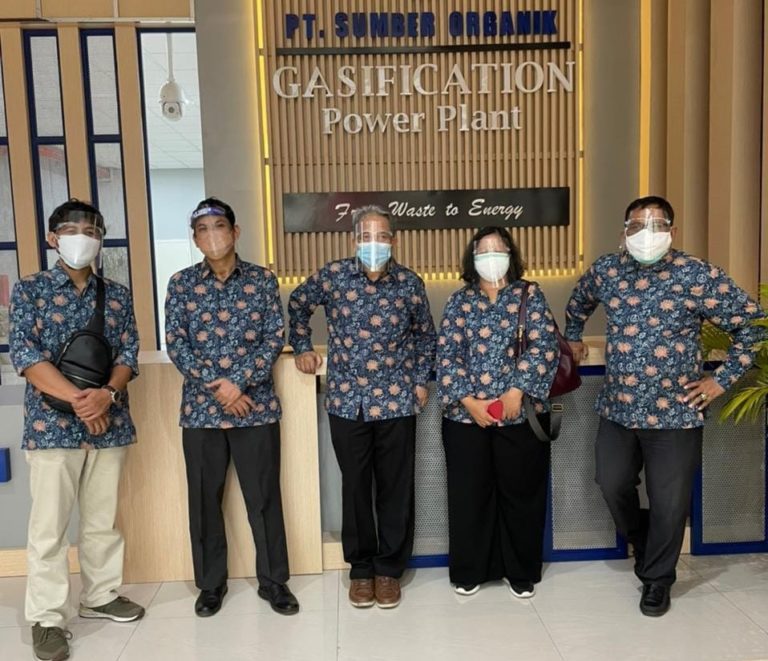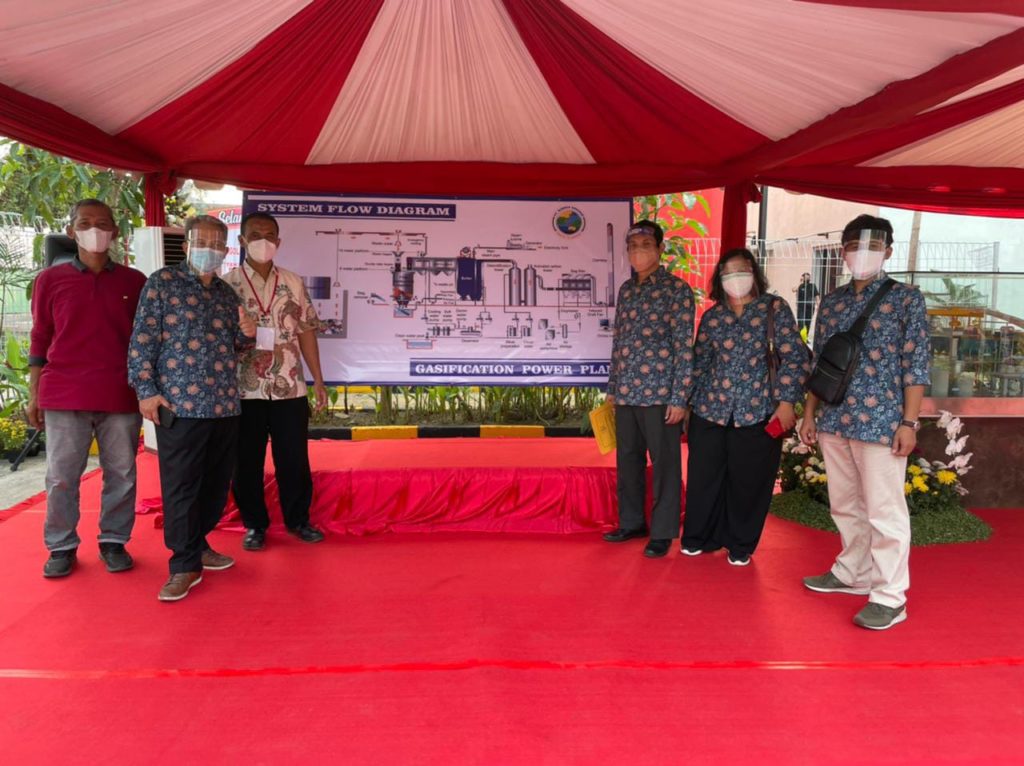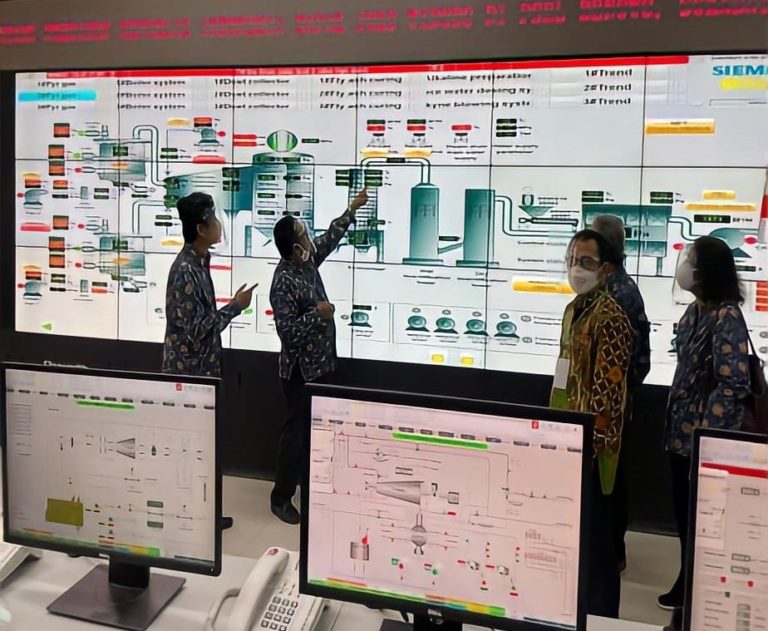ITS Role Behind the Operation of PSEL Benowo

(from left) Dimas Anton Asfani, Ary Bachtiar Krishna Putra, Prof. Joni Hermana, I Dewa Ayu Agung Warmadewanthi, and Mudji Irmawan Arkani while attending the inauguration of PSEL Benowo
ITS Kampus, ITS News – The seriousness of the City of Surabaya as the second-largest city in Indonesia in terms of waste management evidenced by the inauguration of the Benowo, Surabaya Waste to Electrical Energy Processing (PSEL) operation by the President of the Republic of Indonesia Joko Widodo on May 6, 2021. The project, which is the first PSEL in Indonesia with a waste capacity of up to 1,000 tons per day, also involves a team of experts from Institut Teknologi Sepuluh Nopember (ITS).
During the inauguration, President Joko Widodo or who is usually called Jokowi said that big cities in Indonesia are indeed facing a crucial waste problem. The reason is, the waste will not only cause environmental pollution but will also produce leachate which has an impact on decreasing water quality. As of 2018, only one city has succeeded in overcoming this problem, namely Surabaya.
PSEL Benowo, which is currently operating, seems to have a long history and has collaborated with several ITS experts since the beginning. These are Prof. Ir Joni Hermana MScES Ph.D. (Environmental Engineering), I Dewa Ayu Agung Warmadewanthi ST MT Ph.D. (Environmental Engineering), Ary Bachtiar Krishna Putra ST MT Ph.D. (Mechanical Engineering), Dimas Anton Asfani ST MT Ph.D. (Electrical Engineering), Ir Mudji Irmawan Arkani MT (Civil Engineering), and Hendra Cordova ST MT (Engineering Physics).

The team of experts from ITS who played a role behind the operation of PSEL Benowo
I Dewa Ayu Agung Warmadewanthi, one of the ITS Team members in this project revealed that the idea of PSEL development was first conveyed by the Mayor of Surabaya for the 2010-2020 period, Dr. (HC) Ir Tri Rismaharini. “At that time, he had an innovative and courageous idea to solve the waste problem in the city of Surabaya,” said Wawa, his nickname.
Realizing that the amount of waste continues to increase and the Benowo Final Processing Site (TPA) land is unable to accommodate it since 2010 the concept of Waste to Energy has been initiated by the Surabaya City Government (Pemkot) by collaborating with ITS for handling technology and everything related to technical matters.
Then in 2012, the Surabaya City Government signed a cooperation agreement with PT. Sumber Organik (PT. SO) regarding Provision of Infrastructure and Facilities for TPA Benowo. “This is the implementation of the concept of public-private partnership in the field of solid waste infrastructure that was first applied in Indonesia,” said Wawa.
According to the lecturer at the Department of Environmental Engineering, the choice of technology with the gasification concept raises many pros and cons in society. It is a dread that burning waste with the concept of gasification will produce toxic gases and pollute the environment. “In addition, the waste management system without segregation and the high water content of waste is dread that it will fail to be processed by this combustion method,” he said.

ITS team of experts when explaining the operational technicalities of PSEL Benowo
In connection with this technology, ITS together with the Surabaya City Government provide input to PT. SO about what should be done ideally so that waste processing with this gasification concept can run well. “After nearly nine years, PSEL Benowo is finally officially operational,” continued this alumnus of the National Taiwan University of Science and Technology (NTUST).
The processing, which is expected to produce 9 MW of electrical energy, will later add 2 MW of electrical energy that has been generated by the use of methane gas from the landfill at Benowo TPA. Wawa hopes that this PSEL will be able to reduce the garbage dumped into the Benowo landfill. It is hoped that the contribution of the people of Surabaya City will make this technology operate sustainably.
The reason is, continued Wawa, the gasification processing capacity only reaches 1,000 tons per day and, there are still 600 tons remaining that need to be managed by the Surabaya City Government. For this reason, the task of Surabaya residents is to reduce waste residue with the concept of Reduce, Reuse, and Recycle (3R). “Universities such as ITS will certainly play a lot in increasing the 3R efforts with various technologies that can be implemented in society,” he added.
At the end of the conversation, Wawa hopes that the synergy of this collaboration can help the Surabaya City Government in terms of waste management so that the Green and Clean Surabaya concept will go global. “I also hope that this technology will succeed in realizing Surabaya as a world city that is advanced, humanist, and sustainable,” he concluded hopefully. (ITS Public Relations)
Reporter: Erchi Ad’ha Loyensya
Related News
-
ITS Collaboration with BPBD East Java, Launching VR Disaster Simulation
ITS Campus, ITS News — Supporting anticipation of disasters and continuing to educate the public, Institut Teknologi Sepuluh Nopember
May 15, 2021 23:05 -
Supporting the Implementation of Innovative Ideas, ITS and IYSA Hold International Competition
ITS Campus, ITS News — Institut Teknologi Sepuluh Nopember (ITS) has once again proven its commitment to supporting the
May 15, 2021 23:05 -
ITS Maintains Informative Qualification for Five Consecutive Years at KIP Awards
ITS Campus, ITS News — Institut Teknologi Sepuluh Nopember (ITS) has once again successfully maintained its Informative Qualification predicate
May 15, 2021 23:05 -
ITS Strengthens Smart Eco-Campus through UI GreenMetric 2024
ITS Campus, ITS News — Institut Teknologi Sepuluh Nopember (ITS) has once again demonstrated its commitment to environmental concern
May 15, 2021 23:05
